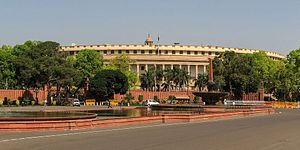On February 1, the Bharatiya Janata Party (BJP)-led Indian government will present an interim budget to fund the government’s expenses until after the Lok Sabha elections of 2019 are concluded. Expectations remain low that there will be any significant developments in this final session before elections since there is an unstated convention that the government usually holds off on introducing any major initiatives until after the elections have concluded. However, a look back at the pre-election interim budgets of 2009 and 2014 shows that the government is still able to press forward on key reforms and legislation.
2009 Interim Budget Session
The 2009 interim budget session was held from February 12 to February 26, before the 2009 General Elections. The then-government, led by the Indian National Congress’ United Progressive Alliance (UPA), considered 21 bills. However, it passed only eight bills. Despite this low number of bills passed, the UPA-I government did send important signals that it took the reforms bill seriously.
One of the key pieces of legislation that the government passed in the Lok Sabha, or Lower House, during the interim budget session of 2009 was the Trade Marks (Amendment) Bill, 2007. The bill not only aimed to simplify the process for applicants to register for trademarks but was also attempted to make India’s trademark regime compliant with the international “Madrid Protocol of 1989,” as negotiated by the International Registration of Marks. While the bill did not pass in the Rajya Sabha, or Upper House, the push to pass this bill shows that governments can and have pushed reform-minded bills in the interim budget session.
Another key development during this session that showed that government has the power to press forward was the introduction of the Industrial Disputes (Amendment) Bill, 2009, which was introduced in the Rajya Sabha on February 26, 2009. While the bill did not pass, the legislation, which amended the procedures for workers to pursue actions in labor courts or tribunals, as well as established redressal mechanisms in the workplace, demonstrated how the government can press forward on labor issues even in the interim budget session.
2014 Interim Budget Session
The 2014 interim budget session, which was held from February 5 to February 21, saw even more significant legislation passed than the session in 2009. Then-Finance Minister P. Chidambaram introduced a new line of expenditure in the budget to support the “One Rank One Pension” (OROP) program, which ensures that the same pension amount was paid to military officers of the same rank and length of service, rather than on the date of retirement. While this program was only introduced in this session and finalized under the successor government led by Prime Minister Narendra Modi, it serves as yet another example of the government taking steps to outline new policy directions in the pre-election budget session.
In the same session, the UPA-II government also passed the controversial Andhra Pradesh Reorganization Bill, 2014, which officially bifurcated the state to create a smaller Andhra Pradesh and a new state of Telangana. These significant moves underscore that, contrary to convention, the government can and has taken major policy decisions in the final parliamentary session before elections.
Looking to the 2019 Interim Budget
Going into the 2019 interim budget session, the government is facing political pressure on several fronts. The specter of Prime Minister Modi’s election promises of good days to come and the creation of 10 million jobs per year continues to hang over the BJP. Moreover, farmer protests around the nation against the government are largely seen as the reason behind the BJP’s losses in three state elections in December 2018. These factors raise the likelihood of the government pursuing significant initiatives during the coming interim budget session.
Some government officials have already begun signaling that there may be substantive decisions taken during the coming session. Principal economic adviser in the finance ministry, Sanjeev Sanyal, said in an interview there might be “some policy guidance in the interim budget.” Other reports have emerged suggesting the government may be considering raising fertilizer subsides, as well as expanding food subsides under the National Food Security Act. The government may also make a final push for some of the 24 pending pieces of legislation in the Lok Sabha, including the Major Port Authorities Bill, the Trade Unions (Amendment) Bill, and the Dam Safety Bill.
Despite the prevailing sentiment is that the government is unlikely to take any significant steps in the pre-election budget session, it is still too early to write off the upcoming session of parliament. Recent history shows that sitting governments can and have taken major policy decisions in such sessions. With growing political pressure from key voting constituencies, it would be wrong to assume that the government will not push for progress on key reforms and legislation before the election.

































